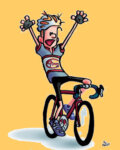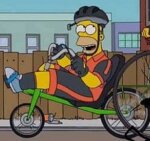Missed connection
Our Community › Forums › General Discussion › Missed connection
- This topic has 5,362 replies, 250 voices, and was last updated 1 year, 7 months ago by
n18.
-
CreatorTopic
-
May 9, 2011 at 1:05 pm #909920
baiskeli
ParticipantThis is my version of a “missed connection” post…
You: headphones, no helmet passing me on the right in the bike lane on Clarendon Blvd. the morning of May 9 about 8 am.
Me: riding safely as usual
You should call your damn passes – especially when passing on the right. I could have swerved right into you.
Dumbass.
-
CreatorTopic
-
AuthorReplies
-
July 17, 2019 at 1:22 pm #1099763
mstone
Participant@Steve O 192154 wrote:
With practice, as with most things, it will become easier.
What’s annoying, though, is that it is not even necessary. A straight line from the top curve to the point where the trail meets the walkway would be no more steep than the switchback (trust me, I did the math). So the whole connection could have been built with just a single 90 degree turn. D’oh.There’s a maximum slope standard and also a standard for maximum run based on the slope. (The idea AFAIK is to limit how far/fast your mobility assist device will go if you lose control on the slope. Running into a railing sucks, but less so than flying over a curb or railing at high speed and into the street or the water.)
July 17, 2019 at 2:07 pm #1099764dasgeh
Participant@mstone 192156 wrote:
There’s a maximum slope standard and also a standard for maximum run based on the slope. (The idea AFAIK is to limit how far/fast your mobility assist device will go if you lose control on the slope. Running into a railing sucks, but less so than flying over a curb or railing at high speed and into the street or the water.)
Have you see the ramp they’re building from the Kennedy Center? It doesn’t seem worse than what would be necessary for the Case Bridge.
July 17, 2019 at 2:19 pm #1099765 Steve OParticipant
Steve OParticipant@mstone 192156 wrote:
There’s a maximum slope standard and also a standard for maximum run based on the slope. (The idea AFAIK is to limit how far/fast your mobility assist device will go if you lose control on the slope. Running into a railing sucks, but less so than flying over a curb or railing at high speed and into the street or the water.)
Aha. So that’s why on long runs, like the ones on the ramps to the ped bridge at 7-Corners, they have those flat spots. Not knowing the actual rules, I’d still put my money on the Case Bridge ramp being possible without the switchback. Have you noticed you have to go back uphill from the bottom of the switchback to get to the circle? It goes down farther than necessary.
July 17, 2019 at 2:23 pm #1099766ChristoB50
Participant@mstone 192156 wrote:
There’s a maximum slope standard and also a standard for maximum run based on the slope. (The idea AFAIK is to limit how far/fast your mobility assist device will go if you lose control on the slope. Running into a railing sucks, but less so than flying over a curb or railing at high speed and into the street or the water.)
I don’t mind engineering in a bit of “triggered slow down” for rolling transports on that particular descent (ie, navigating the two 180-switchbacks) — And while not super-narrow, the path isn’t exactly wide, either (ie, like the switchback descent to Roosevelt Island; a much nicer width!) so bikes descending here mixed with pedestrians climbing safely errs on the side of slowing the rolling traffic… I do wish they had adopted a bigger radius on the 2 switchbacks — more of a “bobby pin” line vs a 180-switchback. But I’m glad they at least curved the 2 switchbacks, vs. using right-angles!
[ATTACH=CONFIG]20247[/ATTACH]
July 17, 2019 at 2:38 pm #1099767dasgeh
Participant@ChristoB50 192159 wrote:
I don’t mind engineering in a bit of “triggered slow down” for rolling transports on that particular descent (ie, navigating the two 180-switchbacks) — And while not super-narrow, the path isn’t exactly wide, either (ie, like the switchback descent to Roosevelt Island; a much nicer width!) so bikes descending here mixed with pedestrians climbing safely errs on the side of slowing the rolling traffic… I do wish they had adopted a bigger radius on the 2 switchbacks — more of a “bobby pin” line vs a 180-switchback. But I’m glad they at least curved the 2 switchbacks, vs. using right-angles!
But it also uses a right angle…
Those switch backs are difficult to impossible for bikes with longer wheelbases — long tails, box bikes, bikes towing trailers. We shouldn’t make the safest infrastructure hard/impossible for family bikers to use!
July 17, 2019 at 2:45 pm #1099768 lordofthemarkParticipant
lordofthemarkParticipantI use both the Wharf PBL AND the Case bridge route.
Even going slowly, the Wharf route is usually faster for me than Case. I get used to dealing with peds and cars coming out of the driveways. Glad they fixed the hole, but wish they would restore the bike marking in the lane, which might help a tad with clueless peds. The worst part is really the part west of the fishmarket, where cyclists, scooter riders, and very clueless peds all mix. When the wharf is worst (Thursday and Friday PMs, generally) I do the Case route, and have gotten much better at ascending the swithback. Will try out the police HQ short cut again. The worst part of the Case bridge route for me is the approach via Capital Square Place and 9th. The speed bumps on CS Place are nasty, and I do get nervous about cutting through the development. And making the right from 9th to Banneker can be challenging. OTOH I like the new protection on Banneker.
July 17, 2019 at 4:13 pm #1099770creadinger
Participant@dasgeh 192160 wrote:
But it also uses a right angle…
Those switch backs are difficult to impossible for bikes with longer wheelbases — long tails, box bikes, bikes towing trailers. We shouldn’t make the safest infrastructure hard/impossible for family bikers to use!
Unless you’re a short person on a small bike it’s impossible for 2 cyclists to pass each other too. Except maybe in the straightaways. Just going around a turn that tight at a slow speed I have to lean well over the other lane just to get around. I hate them, and the primary reason I won’t take that route. When it comes to stupid infrastructure that ramp and the switchbacks rank right up there with the 1-lane MVT under Memorial Bridge, and the stupidly tight sidewalks on the Douglass Bridge.
July 17, 2019 at 4:58 pm #1099771ursus
Participant@lordofthemark 192161 wrote:
I use both the Wharf PBL AND the Case bridge route.
Even going slowly, the Wharf route is usually faster for me than Case. I get used to dealing with peds and cars coming out of the driveways. Glad they fixed the hole, but wish they would restore the bike marking in the lane, which might help a tad with clueless peds. The worst part is really the part west of the fishmarket, where cyclists, scooter riders, and very clueless peds all mix. When the wharf is worst (Thursday and Friday PMs, generally) I do the Case route, and have gotten much better at ascending the swithback. Will try out the police HQ short cut again. The worst part of the Case bridge route for me is the approach via Capital Square Place and 9th. The speed bumps on CS Place are nasty, and I do get nervous about cutting through the development. And making the right from 9th to Banneker can be challenging. OTOH I like the new protection on Banneker.
Although they can be regarded as pedestrians, I would put the clueless tourists getting on and off buses in a category of their own.
July 17, 2019 at 5:36 pm #1099774mstone
Participant@creadinger 192164 wrote:
Unless you’re a short person on a small bike it’s impossible for 2 cyclists to pass each other too. Except maybe in the straightaways. Just going around a turn that tight at a slow speed I have to lean well over the other lane just to get around. I hate them, and the primary reason I won’t take that route. When it comes to stupid infrastructure that ramp and the switchbacks rank right up there with the 1-lane MVT under Memorial Bridge, and the stupidly tight sidewalks on the Douglass Bridge.
In general the driver for ramps is ADA compliance, not cyclists, so it’s not surprising that they tend to be crappy for cyclists. I’d personally prefer stairs with a wheel gutter most of the time over a narrow twisty ped ramp, but they rarely ask me.
 A wide path with large turning radius is the cadillac, but it does cost more than the bare minimum and there just doesn’t seem to be a budget for that most of the time.July 17, 2019 at 5:38 pm #1099775
A wide path with large turning radius is the cadillac, but it does cost more than the bare minimum and there just doesn’t seem to be a budget for that most of the time.July 17, 2019 at 5:38 pm #1099775 bentbike33Participant
bentbike33Participant@ursus 192165 wrote:
Although they can be regarded as pedestrians, I would put the clueless tourists getting on and off buses in a category of their own.
I would put the Wharf area tourists in the same category as the MVT geese, although I suspect it may be easier to train the geese to the meaning of a bike bell.
July 17, 2019 at 6:14 pm #1099776Brendan von Buckingham
ParticipantWheelchair ramp maximum slope is 1:20.
July 17, 2019 at 6:16 pm #1099777Brendan von Buckingham
ParticipantI was going to list all the reasons why I just use Maine Avenue both inbound and outbound. But you guys have already done that for me.
July 17, 2019 at 6:34 pm #1099784huskerdont
ParticipantI think these ramps can be a good time. Since the zig-zag was done at Four Mile Run near the airport (up to the Potomac Yard Trail), I don’t think I’ve ever done the airport loop without going up and down. I guess it’s the mountain biker in me wanting to still have a spot of fun. The Case Bridge/Wharf one is less challenging but would be almost as good except there are more peds.
July 18, 2019 at 12:17 am #1099796dbb
Participant@Brendan von Buckingham 192171 wrote:
Wheelchair ramp maximum slope is 1:20.
Actually, 1:12. According to the 2010 ADA Standards for Accessible Design
405.2 Slope. Ramp runs shall have a running slope not steeper than 1:12.
405.6 Rise. The rise for any ramp run shall be 30 inches (760 mm) maximum.
July 18, 2019 at 11:06 am #1099802Brendan von Buckingham
ParticipantSorry for getting lazy with the terminology. Technically it’s an “accessible route” not a ramp (same source, 206.2) and the maximum slope for accessible routes is 1:20 (403.1, 403.3). When you get into ramps at entrances and within buildings you are allowed steeper slopes like 1:12, but those steeper steeper slopes have maximum heights and runs which limit their length and require extra landings and turns. If you have room for 1:20 there is no limit to rise or run so you don’t need a ton of switchbacks like you do for 1:12 and other steeper slopes.
-
AuthorReplies
- You must be logged in to reply to this topic.